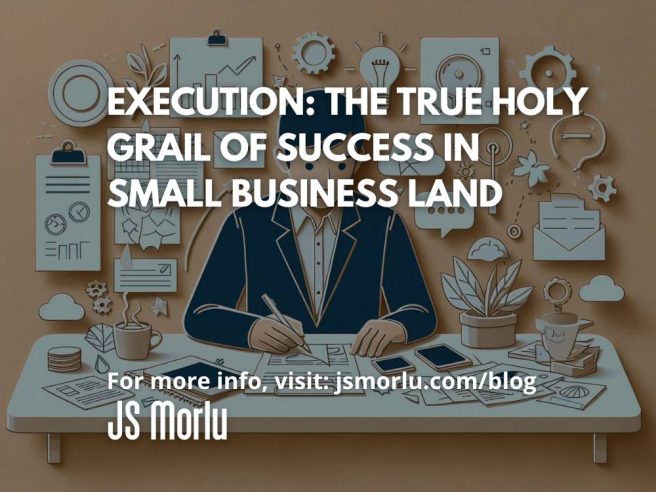By: John S. Morlu II, CPA
This is the grim truth. Forget the exaggerated claims about 75% or 90% failure rates—let’s look at the real numbers. According to data from the U.S. Bureau of Labor Statistics (BLS), 50% of small businesses don’t make it past the five-year mark. The honeymoon is short, and the divorce rates are high in the world of startups. It’s like launching a rocket with dreams of reaching the stars, only to find out halfway through the countdown that you’ve run out of fuel.
Here’s how it breaks down:
- 20% of businesses fizzle out within the first two years.
- 45% don’t survive their fifth birthday.
- By the time you hit the 10-year mark? Only 35% are left standing.
- And if you’re in it for the long haul? Only 25% of businesses live to celebrate their 15th anniversary.
But here’s the kicker: the biggest killer isn’t a bad idea. No, most businesses don’t fail because the concept was flawed. It’s far more brutal than that. It’s the lack of execution that buries them—the inability to turn that bright spark of inspiration into a real-world product or service that thrives. Call it what you will: execution, follow-through, operational grit—without it, even the best ideas are doomed to rot in the graveyard of unrealized potential.
Now, imagine for a moment, if you will, the magical kingdom of Small Business Land. At its heart, nestled in a lush valley surrounded by glittering hills of venture capital, lies the once-thriving village of InnoVale. This was no ordinary town. Here, ideas were as common as wildflowers. Every day, a fresh batch of inhabitants would emerge from the startup forest, their pockets jingling with ambition and optimism. Each was armed with “the next big idea”—some kind of revolutionary app, a disruptive tech gadget, or even an artisanal cupcake delivery service. InnoVale’s town square pulsed with the excited hum of entrepreneurial whispers, promises of future empires, and the occasional confident shout of “We’re going to be the next Uber, but for ferrets!”
But as time passed, something curious—and downright disturbing—began to happen. For every 100 ideas that bounced around the cobblestone streets, only one managed to materialize into something tangible—a business, a product, or a service. And of that tiny fraction, only a select few ever made it past the terrifying one-year curse.
The villagers soon realized their town had a problem, one that no amount of creativity or disruptive thinking could solve. The missing ingredient? You guessed it: execution. Ideas were plentiful, but turning them into something real—something that actually worked—was like finding a Wi-Fi signal in the middle of a dense forest.
The heroes of InnoVale weren’t the dreamers; they were the doers. The brave souls who slogged through the day-to-day grind, the ones who knew that starting a business wasn’t about getting rich quick but about making things happen—every single day. InnoVale needed fewer visionaries and more people who knew how to roll up their sleeves and do the boring stuff: shipping products, building processes, talking to customers, managing cash flow, fixing bugs, and showing up, even when the excitement had worn off.
And so, InnoVale’s wise elders came to an inescapable conclusion: Execution was the true magic that separated the dreamers from the doers, the flops from the unicorns. It wasn’t about having the best idea but about who could bring it to life and keep it alive long enough to matter. Ideas were the seed, but execution was the water, sunlight, and relentless weeding that made them grow.
In the kingdom of Small Business Land, execution wasn’t just a skill—it was survival.
Chapter 1: The Birth of “IdeaLandia” – A Cautionary Tale
Once upon a time, in a neighboring hamlet nestled just beyond the borders of InnoVale, there was a peculiar village known as IdeaLandia. Everything in IdeaLandia was made of… well, ideas. The streets were paved with concepts, the houses were built from blueprints, and even the village tavern served frothy mugs of abstract thought on tap. The local fountain was called the “Fountain of Inspiration,” which continuously bubbled with fresh ideas, spitting out concepts like automatic dog-walkers, teleporting pizza boxes, self-washing laundry, and even a completely renewable, self-sustaining “eco-burger” made from organic clouds (it was gluten-free, naturally).
In IdeaLandia, having an idea was like breathing air—it was just what you did. Every villager had at least three business pitches ready at all times, just in case a wandering venture capitalist happened to stroll by.
The mayor of IdeaLandia was none other than Professor “Wunderkind” Wonderstein, a self-proclaimed visionary with a towering reputation for brilliant ideas that could “change the world.” A master of TED Talks, with over 10 million views on “The Power of Thinking Big (But Not Doing Much),” Professor Wonderstein regularly delivered grandiose speeches to the townspeople. On one particularly foggy morning, he gathered the villagers around the Fountain of Inspiration for one of his legendary Idea Sermons.
With a sweeping gesture, he began: “Fellow Thinkers! It is clear to me—and it should be clear to you—that the future of our village, our prosperity, our very existence, depends on one thing and one thing only: thinking! We must be better thinkers than the others! No more mediocre thoughts, no more half-baked ideas! Only the best! If we out-idea the neighboring villages, we will win this great race!”
The crowd erupted into applause, cheering wildly for Professor Wonderstein. Finally, the secret to success was clear. They didn’t need factories, or shops, or even workers. No, no! They just needed better ideas. This was their competitive edge. Other villages might dirty their hands with trivial matters like “production” and “execution,” but not IdeaLandia. They were thinkers, not doers!
And so, the Great Idea Boom began. Every morning, the villagers would gather around the fountain to brainstorm. Soon, IdeaLandia was overflowing with ideas that would make even the wildest episode of Shark Tank look tame.
There was:
- The Hovering Lawn Chair: For people too lazy to sit in chairs the traditional way.
- The Mood-Matching Wardrobe: Outfits that changed colors based on how you were feeling (though some days it just made everyone look purple and grumpy).
- Teleporting Pizza Boxes: So you could order pizza in Rome and have it appear instantly in your living room in IdeaLandia (no one had figured out how to teleport the pizza yet, just the box).
The ideas grew bigger and more outlandish by the day. There was no problem too small or too ridiculous for the inventive minds of IdeaLandia. And yet, there was one small hitch. Despite the flood of ideas, no one seemed to be making any money. Businesses never got off the ground, prototypes never saw the light of day, and most villagers found themselves too busy coming up with new ideas to do anything about the old ones.
One day, Melvin the Modest, a shy villager with a perpetually wrinkled shirt and an aversion to public speaking, stood up during one of Professor Wonderstein’s grand speeches. “Uh, Professor, sir,” he mumbled, nervously pushing his glasses up his nose, “I couldn’t help but notice… we, um, haven’t actually made anything yet. And I, uh, think I’m out of money.”
The crowd gasped. Blasphemy! How could anyone question the power of ideas? Professor Wonderstein, looking bemused, responded: “Melvin, my dear boy. You’re simply thinking too small! You see, money is for the practical-minded. We, the thought leaders, are building something far more valuable—the future! Don’t you worry about money. Once the world realizes the brilliance of our ideas, the gold will come rolling in.”
Melvin scratched his head, unconvinced. But over the next few months, more and more villagers came forward with a startling realization: nobody was buying their ideas. Sure, they had mountains of patents, sketches, and business plans, but none of it ever actually materialized into a product, service, or—dare we say it—revenue.
According to research by Harvard Business School, the success of an idea depends only 5% on the idea itself and 95% on execution. The history of innovation is littered with examples of this—Thomas Edison didn’t invent the first lightbulb, but he was the one who figured out how to make it last longer than a few hours (and then marketed it). Similarly, Apple didn’t invent the smartphone; they just made it easier to use, prettier, and more marketable than their competitors.
The people of IdeaLandia had fallen into a common trap. They had mistaken ideas for execution, forgetting that having a great idea is just the beginning. It’s what you do with the idea that really matters.
Reality finally hit IdeaLandia like a poorly thought-out teleportation accident. The village was bankrupt. The villagers had all maxed out their “Idea Equity” credit cards, and the Fountain of Inspiration had dried up, leaving only a sad, sputtering drip of half-baked concepts. The streets were littered with discarded blueprints and crumpled business plans.
As a final act of desperation, the villagers turned to their once-beloved mayor. “Professor Wonderstein!” they cried. “What should we do? We’re out of ideas!”
The professor, stroking his chin thoughtfully, paused for a long moment before delivering his most profound insight yet: “Perhaps… it’s time we actually do something.”
And thus, the cautionary tale of IdeaLandia comes to a close. The villagers, now humbled by their over-reliance on ideas, began to shift their focus. They rolled up their sleeves, formed partnerships with InnoVale, and started to execute on their ideas. Slowly but surely, the village began to rebuild—not with thoughts and daydreams, but with real products, services, and businesses that worked.
As the wise elders of Small Business Land like to say: “Ideas are like pizza boxes—cool in theory, but useless unless there’s something inside.”
Chapter 2: Meanwhile, in “Executiontown” – A Place Where Stuff Gets Done
On the other side of Small Business Land, far from the dreamy skies and lofty aspirations of IdeaLandia, lay a town that wasn’t quite as glamorous but had one thing going for it: they got stuff done. This was Executiontown, where the motto was “It doesn’t have to be perfect—just done.” Here, no one had time for grandiose ideas or over-the-top visions of the future. They were too busy… executing.
The mayor of Executiontown was Bob “Get-It-Done” Grinders, a man built like a bulldozer, with the personality to match. He wasn’t much of a thinker, but boy, could he make things happen. Bob had a strange but effective management technique: each morning, he’d march down the streets with a megaphone in one hand and a clipboard in the other, shouting:
“Good enough is good enough! Just get it out the door!”
And that’s exactly what the citizens of Executiontown did. If IdeaLandia was obsessed with coming up with the next big thing, Executiontown was focused on getting yesterday’s big thing finished today. The people here were the epitome of “learning on the job.” They didn’t let the lack of a perfect plan hold them back. If they needed to build a bridge, they’d build half of it and figure out the rest when they got there. The town’s mantra? “Ship fast, learn faster.”
Take the town’s biggest startup, Flopflix. It started out as a streaming service for documentaries about leaky faucets—yes, really. A couple of guys threw it together in a week and thought, “Well, let’s see what happens.” Predictably, not much happened—at first. Turns out, the audience for water-related malfunctions was… limited. But because the team didn’t wait for perfection, they had enough time to pivot when things flopped. A year later, Flopflix was a fully functional streaming service with every type of movie, from rom-coms to horror flicks. They even had a small but loyal niche market for DIY plumbing documentaries (some things never change).
The success of Flopflix wasn’t because of some groundbreaking idea, but because the team did the one thing IdeaLandia never could—they launched. Sure, they made mistakes, but they learned, adjusted, and most importantly, they didn’t get stuck in “what if.” They just did.
Then there was BurgerDone, Executiontown’s famous burger chain. Were their burgers the best in the land? Absolutely not. Were they the fastest? Oh, yes. Their whole value proposition was simple: “Get your burger faster than you can blink.” Quality wasn’t the focus—speed was. They cut corners, they skipped frills, and they shaved precious seconds off cooking times with their patented “half-cooked-but-still-safe-to-eat” technology.
The Executiontownians were a proud people who didn’t care if the burger was medium rare or if the lettuce was slightly wilted. They didn’t even care if the ketchup was still in the bottle—they were going to execute that meal. You got what you came for: food, fast. And like magic, people kept coming back.
Executiontown wasn’t built on pretty ideas or abstract thinking; it was built on one cold, hard truth: execution is everything. They knew that 92% of startups fail, and it’s rarely because of bad ideas. No, most startups fail because they couldn’t figure out how to actually do the thing they dreamed up. According to a CB Insights study, 42% of failed startups said there was no market need for their product, and another 29% ran out of cash or couldn’t execute on time.
And so, while IdeaLandia marinated in dreams, Executiontown thrived by doing the work. The town elders understood that in today’s world, coming up with a product is the easy part. You could hire someone from far-off lands to develop an app for $25,000, or buy a pre-packaged website with the click of a button. Ideas were cheap, but execution was expensive. Not in money, but in the grit, persistence, and sleepless nights needed to bring an idea to life.
Executiontown wasn’t glamorous, but they didn’t care. They weren’t aiming for innovation; they were aiming for results. When it came to getting things done, they had a competitive advantage over IdeaLandia and other towns who overthought everything.
The secret to their success? They kept things simple:
- Ship fast, even if it’s half-baked.
- Fix it on the fly. Perfection can wait.
- Don’t let failure stop you. It’s just a learning opportunity.
Bob Grinders would often say, “We’re not here to be perfect, we’re here to be profitable.” The companies in Executiontown didn’t always start off great, but they evolved quickly. There was Flopflix, BurgerDone, and the Halfway House, a construction company that literally only built half your house (you were responsible for finishing the other half—DIY builds character, they’d say). These companies didn’t worry about having the best ideas; they just wanted to be the first to deliver.
Executiontown’s obsession with action over ideas gave them a distinct edge. They understood that in business, ideas are like ingredients. You can have the finest ingredients in the world, but if you don’t actually cook them, all you’ve got is a raw, unappetizing mess.
In the end, Executiontown wasn’t a place for daydreamers—it was a place for doers. And while they didn’t always get things right, they got things done, and that was more than enough. After all, as the wise Bob Grinders often reminded his people:
“Perfection is the enemy of profit.”
Chapter 3: The Fabled Adventures of Sir Ideator and Sir Executor
Enter Sir Ideator and Sir Executor, two wandering knights whose paths were destined to cross in the grand (and often ridiculous) battlefield of business. Though both were valiant in their own right, their approaches to success couldn’t have been more different.
Sir Ideator hailed from the lineage of IdeaLandia, a land of perpetual brainstorming, where the clouds were made of high concepts and every sunrise brought a fresh batch of “disruptive innovations.” Sir Ideator’s armor gleamed in the sunlight, emblazoned with shiny logos and decorated with the finest buzzwords: blockchain, AI, synergy—words so powerful, they could start (or ruin) a thousand startup pitches.
Wherever Sir Ideator went, inspiration followed. He would burst into taverns shouting, “What if we created a subscription service for unicorn haircuts?” or “Imagine a decentralized marketplace for enchanted swords!” He always had the next big thing. His battle cry? “Think bigger!”
Sir Executor, on the other hand, was a knight from the humble yet industrious village of Executiontown. His armor was worn and practical, with dents that told stories of many a skirmish with deadlines, limited resources, and unforeseen glitches. While Sir Ideator carried a sword made from visionary ideals and futuristic concepts, Sir Executor wielded a simple but effective checklist sword—the ultimate weapon of getting things done.
While Sir Ideator could often be found staring into the horizon, dreaming of his next great invention, Sir Executor was knee-deep in the mud, fixing wagon wheels or patching leaky roofs. His motto? “Get it done first, dream later.”
One fateful day, their paths collided in a daring new startup venture: ThinknDo. They’d been summoned by the King of Businessia, who was tired of all the royal coffers being drained by poorly executed moonshot ideas. The startup’s goal was to create something truly groundbreaking, something that would change the land of Businessia forever.
As expected, Sir Ideator was full of flamboyant ideas right out of the gate. “What if,” he announced with a flourish, “we create an app that connects chickens to the blockchain? Crypto-coops! Chickens that are digitally optimized for the farm of tomorrow!”
He even envisioned chickens that could lay NFT eggs—eggs that were unique digital assets and couldn’t be cracked, let alone scrambled.
The room was silent. Even the local jester was confused.
Sir Executor, always the pragmatist, scratched his chin. “That’s all well and good, Sir Ideator, but who’s going to feed the chickens? Blockchain or not, they still need grain.”
Details like “feeding chickens” didn’t concern Sir Ideator, of course. “That’s what outsourcing is for,” he declared.
Thus began the great experiment known as ThinknDo. And, just as predictably, the two knights faced their first battle: turning the chicken-crypto idea into a functioning business.
Sir Ideator’s grand visions spiraled out of control. He spent weeks crafting vaporware, convincing local townsfolk that the chickens could peck out code, and giving presentations on disruptive poultry solutions. Meanwhile, Sir Executor quietly began building a simple app that tracked chicken feed deliveries. He wasn’t trying to change the future; he was just trying to make sure the chickens didn’t starve.
Three months later, Sir Ideator was still chasing wild ideas, attempting to infuse the project with even more complexity. “What if the chickens themselves were NFTs? Imagine a world where every cluck is a smart contract!”
Meanwhile, Sir Executor’s chicken-feed app had launched. It wasn’t glamorous. There were no blockchain chickens, no NFT eggs, and certainly no clucks turning into cryptocurrency. But there was something far more powerful: profit. Farmers loved the app, and before long, Sir Executor had cornered the market on chicken logistics.
Six months later, ThinknDo had become a stable business, thanks almost entirely to Sir Executor’s gritty focus on execution. Sir Ideator, though still distracted by ideas like metaverse barns and virtual reality livestock, was finally starting to see that while visionary ideas were exciting, they weren’t worth much without action.
The moral of the story became clear: while Sir Ideator’s grand vision might someday revolutionize the world, it was Sir Executor’s relentless focus on getting things done that paid the bills and built a sustainable business.
As word spread of their fabled adventures, taverns across Businessia began to echo with new proverbs:
- “A grand idea without action is like a sword without a blade.”
- “Better a chicken fed today than an NFT egg tomorrow.”
- “Ideas are plenty; execution is priceless.”
The King of Businessia was so pleased with ThinknDo’s success that he granted Sir Executor the highest honor in the land: the Golden Checklist. It wasn’t shiny, it wasn’t fancy, but it was the most coveted prize in all of Businessia because it symbolized the rarest treasure of all in the business world: a finished product.
And thus, Sir Executor’s name became legend in the annals of Businessia. As for Sir Ideator? Well, he continued to travel the land, dreaming of his next big idea. But now, he had learned the greatest lesson of all: every idea needs its daydreamer, but every dreamer needs a doer to make that dream come true.
After all, the fabled knights of Businessia would never forget that execution is the only currency that truly matters.
So, the next time you find yourself caught up in a grand idea or fantastical vision, remember the tale of Sir Ideator and Sir Executor. Be bold, dream big, but—like Sir Executor—always carry a checklist. You never know when you’ll need to feed the chickens.
Chapter 4: Execution vs. The Myth of Perfection
In the distant land of startups, there exists a place called IdeaLandia, where founders obsess over the tiniest details. “The logo needs more pizzazz,” they’d say, or “The website isn’t quite user-friendly enough,” refining endlessly. Spoiler alert: they never launch.
Perfection is a myth—an enticing, shiny myth like a 10-hour workweek or the fountain of youth. If you wait for everything to be perfect, you’ll end up in perpetual pre-launch mode, trapped like the eternal tinkerers of IdeaLandia. Meanwhile, the world moves on, customers grow impatient, and competitors steal your thunder. The more you chase perfection, the more elusive it becomes.
Perfection: The Silent Killer of Progress
One of the most dangerous myths is that success only comes when every detail is flawless. The belief is that if you make your product perfect, customers will come. As Voltaire said, “Perfect is the enemy of good.” The pursuit of perfection doesn’t guarantee success; it guarantees paralysis. While you’re polishing every detail, someone else is selling a product that’s not perfect but good enough—and good enough often wins.
Real champions launch early, learn fast, and iterate quickly. Success isn’t about crafting the perfect product—it’s about launching something functional and improving it based on real feedback, not endless speculation.
The Trap of Perfectionism
Perfectionists are busy refining slides and tweaking prototypes while doers ship their work. Success isn’t about flawless execution; it’s about getting your product into customers’ hands quickly and improving as you go. Entrepreneurs who prioritize execution understand that a product with a few rough edges is far more valuable than a perfect product that never launches.
The Frank Overdrive Philosophy: “Launch Now, Fix Later”
Imagine a CEO, Frank “The Tank” Overdrive, running a company called “Dented” Industries. Frank’s empire wasn’t built by waiting for perfection; he shipped products that were good enough. His slogan? “It’s good enough, and that’s all you need.” Frank understood that customers weren’t looking for perfection, but for a product that worked. When issues arose, Frank’s team improved the product based on feedback.
Frank’s approach wasn’t about mediocrity—it was about speed and adaptability over the illusion of perfection. He knew that being the first to market, even with a dented product, often leads to success if you’re willing to improve.
The Power of Shipping
Shipping your product, even when it’s not flawless, is key to gathering invaluable customer feedback. Feedback allows you to iterate and refine based on real-world data. By launching early, you become part of the market conversation, learning, growing, and evolving with your customers. The longer you wait for perfection, the more opportunities you miss to build relationships and learn what works.
Execution: The Real Competitive Edge
Execution is the ultimate competitive edge. Successful entrepreneurs know good enough is often better than perfect. They focus on delivering a functional product and improving it based on real-world use. The myth of perfection suggests everything must be perfect before taking the next step, but the winners are those who execute quickly, gather feedback, and adapt.
The bottom line? Don’t polish your product until it’s shiny. Ship it with the dents, and improve as you go. Execution leads to progress, and in business, progress is far more valuable than perfection.
Chapter 5: The Fable of the Pivot – When Execution Means Change
In the whimsical realm of Executiontown, where ideas spring to life and entrepreneurs hustle like caffeinated squirrels, the path to success is rarely a straight line. Sometimes, it’s a winding road filled with twists, turns, and the occasional dragon. This is where our tale begins, with a brave inventor named Sally SoundAsleep.
The Rise and Fall of SnoreCure
Sally, a visionary with a passion for peaceful sleep, set out to create a revolutionary wearable device named SnoreCure. She executed her plan flawlessly—prototypes were crafted, investors were secured, and the product launched with the kind of fanfare usually reserved for royal weddings. People were abuzz with excitement, imagining restful nights and quiet dreams.
But there was a flaw. Despite all the buzz, SnoreCure didn’t stop snoring. In fact, it increased snoring by 25%. Instead of serene nights, users were greeted by a cacophony that sounded more like a symphony of chainsaws. Sally’s dreams quickly turned into nightmares, and her once-enthusiastic investors were now very displeased.
The Pivot: A Heroic Transformation
Many entrepreneurs might have thrown in the towel, but not Sally. She had a secret weapon: the art of the pivot. With her trusty sidekick, Larry “The Lifesaver,” an over-caffeinated consultant brimming with ideas, Sally decided to shift gears.
“What if,” Larry suggested over a double espresso, “we stop trying to cure snoring and instead focus on tracking sleep patterns?” Sally’s eyes sparkled with renewed excitement. The data had shown that while SnoreCure was a bust at reducing snoring, it was surprisingly good at monitoring users’ sleep habits.
Rebranding to SleepSense
With this new insight, Sally pivoted, rebranding SnoreCure into SleepSense—a sleek, stylish device that tracked and analyzed sleep patterns rather than trying to silence snoring. The pivot was nothing short of heroic. Gone were the nights of dread. SleepSense promised insightful data, helping users understand their sleep behaviors and improve their overall rest.
The rebrand was a hit! The once-failing product became a sensation, with customers and critics alike praising its ability to offer users valuable insights into their sleep cycles—how long they spent in REM sleep, how often they tossed and turned, and even how many times they snored throughout the night.
A Lesson in Adaptability
Sally’s pivot wasn’t just a clever rebranding—it was a testament to the power of adaptability. She learned that execution isn’t just about following a plan to the letter. Sometimes, it’s about recognizing when to change course. Sally SoundAsleep transformed what could have been a devastating failure into a roaring success by embracing the power of the pivot.
In business, success often requires flexibility and the courage to evolve. Sally’s ability to pivot turned a potential disaster into an opportunity, proving that a great entrepreneur doesn’t just stick to the original vision. They adjust, adapt, and are willing to change direction when necessary.
A Tidbit of Wisdom
Pivoting isn’t just for startups or inventors like Sally. Every business, regardless of size or industry, can benefit from mastering the skill of the pivot. Whether it’s adjusting a strategy, reworking a product, or tweaking a business model, the ability to adapt can be the difference between stagnation and growth. Embrace the spirit of Sally SoundAsleep, and remember: when execution means change, you’re not just surviving—you’re thriving!
Chapter 6: The Rise of “DoerDay”
In the bustling realm of InnoVale, a transformative celebration emerged—DoerDay, a holiday dedicated solely to getting things done. The villagers of InnoVale, known for their innovative ideas and relentless drive, declared a day where no new ideas were allowed—only action! It was a day reserved for revisiting half-baked projects, dusting off old plans, and finally launching those “good enough” products that had been sitting on the back burner for too long.
The Essence of DoerDay
On DoerDay, the people of InnoVale came together in a joyous 24-hour frenzy of productivity. The goal? To finish something—anything—that had been left undone. Whether it was launching a quirky app, fixing a prototype, or polishing a rough draft, villagers put aside their perfectionist tendencies and focused on completing tasks. The motto of the day was simple: “Done is better than perfect.”
A Day of Chaos and Celebration
DoerDay wasn’t a picture of order and perfection—it was a beautiful mess of creativity and progress. Some villagers launched apps with bugs, others patched together half-baked ideas, and a few even discovered new purposes for old, forgotten projects. Laughter and camaraderie filled the air as everyone realized the true goal wasn’t perfection—it was progress.
The winner of DoerDay was crowned with the Golden Checklist, a symbol of the town’s core belief that execution always trumps perfection. Even those whose projects didn’t turn out as planned left the day with new insights and a sense of accomplishment, knowing they had finally taken action.
The lesson of DoerDay? Success comes to those who do, not just those who dream.
Chapter 7: Fun Facts – The Secret Magic Behind Every “Boring” Success
Once upon a time, in a world not too different from our own, the most exciting companies of today started off as rather boring ideas. Hard to believe, right? But every unicorn you admire was once just a humble pony, trotting around with an idea that hardly raised an eyebrow.
Most Unicorns Were Boring Ideas Once
Take Uber, for instance. Before it became a global phenomenon that disrupted the entire transportation industry, it was essentially a glorified taxi service with an app. The founders didn’t set out to create teleportation devices or invent flying cars—they just wanted a quicker way to catch a ride. Not exactly “unicorn” material at first glance, is it?
Then there’s Airbnb. Now, it’s a massive empire of short-term rentals and vacation getaways, but back in the day, it was basically a platform for couch-surfing. Strangers renting out their spare rooms to other strangers? Sounds like a crazy idea pitched over too many ales at the local tavern. Yet here we are, with Airbnb hosting millions of travelers each year.
And who can forget Amazon? Today, it sells everything under the sun and delivers it faster than you can say “Prime shipping.” But when Jeff Bezos first launched it, it was nothing more than a simple online bookstore. Hardly the stuff of legend! Fun fact: Bezos originally wanted to call it “Cadabra,” but a lawyer misheard it as “Cadaver.” Not the vibe you want for a delivery service—“Would you like to buy a book from Cadaver.com?” No thanks!
The real magic of these companies didn’t come from their brilliant original ideas. No one woke up one day and said, “You know what the world really needs? A short-term rental service for people who love futons!” Their magic came from their relentless focus on execution—improving operations, pivoting when necessary, and learning from every hiccup.
Executiontown’s Golden Rule: 92% of Startups Fail – Execution is to Blame
In the fabled land of Executiontown, there was one rule every entrepreneur lived by: 92% of startups fail, and it’s not because of bad ideas. No, it’s because of poor execution. According to sages at CB Insights, 42% of startups fail due to a lack of market need (no one wants your enchanted potato peeler), while 29% simply run out of cash or can’t execute on time. It’s a tragedy—so many potentially great ideas never make it past the drawing board.
This is where Sir Ideator from our last chapter would nod solemnly. While he dreamed of crypto-chickens, Sir Executor ensured those chickens were, you know, alive. In business, this attention to detail separates the legends from the could-have-beens.
You Don’t Need Magic, You Just Need Grit
The truth is, building a product today is easier and cheaper than ever. In Executiontown, local wizards could whip up an entire app with just $25,000 and some elbow grease. No enchanted scrolls or potions of wisdom—just a reliable team of developers.
So, if everyone can build an app, what’s the hard part? Execution! It’s the infrastructure, the processes, and the determination to bring your product to life. Forget about hiring the best enchanters or conjuring up the next viral idea. The true magic lies in the ability to get things done—over and over, with precision and grit.
Did You Know? Amazon’s Early Years Were a Comedy of Errors
Villagers of Executiontown loved to share stories about Amazon’s early years, filled with humor and reassurance. For instance, Bezos often packed boxes on his knees. One early employee suggested, “I think we should get knee pads.” To which the employee replied, “How about tables?” Sometimes, even the brightest minds miss the obvious!
There’s also the infamous crash of 1996 when the site went down for several hours on its busiest day. Instead of panicking, the team used it as a lesson to improve their systems. That’s the essence of execution—making mistakes, learning, and course-correcting without losing momentum.
The Moral of the Story: Execution Is the True Unicorn
As village elders often said, “Ideas are like bellybuttons—everyone’s got one, but not all are useful.” The real secret to success isn’t conjuring wild ideas; it’s how well you execute them. Execution is the real unicorn. Ideas may sparkle, but without the grit to back them up, they fizzle out like a sparkler in the rain. So dream big, but execute bigger—and remember: Don’t name your company Cadaver!
Fun Fact: 50% of Companies Fail After 5 Years—But Those That Adapt Thrive
According to the Bureau of Labor Statistics, about 20% of businesses fail in their first year, and by the fifth year, that number grows to 50%. The key to surviving? Adaptation. Companies that focus on executing, learning, and evolving are the ones that stand strong.
What happened to the residents of IdeaLandia? After wallowing in endless brainstorming sessions, they learned the error of their ways. They began visiting Executiontown for advice, attending workshops led by Sir Executor on “Getting Stuff Done.” Today, the two villages are united under one banner: “Good Ideas + Relentless Execution = Success.” The citizens of InnoVale now live happily ever after—not because they stopped dreaming, but because they learned the hard-earned truth: ideas are only as good as their execution.
Fun Fact: Fail Faster, Succeed Sooner
In Executiontown, there’s a saying: “Fail faster, succeed sooner.” The quicker you fail, the quicker you learn—and learning is where the real magic happens. Take Slack, for example. It didn’t start as a messaging app but as a video game company called Glitch, which failed spectacularly. Yet, from the ashes of Glitch, they realized they had built an internal messaging tool that was far more useful. Had they waited for the “perfect” game, they might never have stumbled upon the winning formula.
So, embrace the dents. Launch with the wobble. The sooner you’re out in the world, the sooner you can fix those wobbles and create something truly great.
Fun Fact: Launch Now, Apologize Later
Legend has it that Frank’s first product was a wooden wheel with a slight wobble. It wasn’t perfect, but it was functional. Frank sent the wobbly wheel to market anyway and struck gold—not because of the wobble, but because he was the first to sell a wheel in the region. While competitors were still trying to eliminate their wobbles, Frank was already rolling in coins.
When customers complained, Frank had a simple solution: “We’ll fix it in the next version.” By Version 2.0, the wobble was reduced, and by Version 3.0, it was practically smooth. The lesson? Perfection is a luxury, but getting to market is a necessity.
Fun Fact: Execution is the #1 Skill That Entrepreneurs Need
A study from the Harvard Business Review highlights that execution is the number one skill separating successful entrepreneurs from failed ones. A strong idea is just the beginning. To succeed, entrepreneurs need leadership, decision-making, operational know-how, and adaptability. More importantly, they need to ensure things happen—constantly. The success of Uber, Amazon, and Airbnb wasn’t because they invented entirely new concepts; it was their ruthless execution.
The inhabitants of InnoVale learned this by embracing a powerful lesson: ideas are everywhere, but execution is rare. It’s not the smartest or most creative who thrive; it’s those who roll up their sleeves and keep grinding until the work is done.
Final Fun Fact: The Execution Mindset in Everyday Life
Execution isn’t just for business. People with an execution-first mindset often succeed in various areas, from weight loss to learning new skills. A study from the American Psychological Association showed that those who focus on the process of achieving their goals—rather than endlessly planning—are more likely to succeed.
So, next time you have a brilliant idea, remember the tale of InnoVale. Start small. Start messy. Just start! Because while ideas may light the spark, it’s execution that fans the flames.
Author: John S. Morlu II, CPA is the CEO and Chief Strategist of JS Morlu, leads a globally recognized public accounting and management consultancy firm. Under his visionary leadership, JS Morlu has become a pioneer in developing cutting-edge technologies across B2B, B2C, P2P, and B2G verticals. The firm’s groundbreaking innovations include AI-powered reconciliation software (ReckSoft.com) and advanced cloud accounting solutions (FinovatePro.com), setting new industry standards for efficiency, accuracy, and technological excellence.
JS Morlu LLC is a top-tier accounting firm based in Woodbridge, Virginia, with a team of highly experienced and qualified CPAs and business advisors. We are dedicated to providing comprehensive accounting, tax, and business advisory services to clients throughout the Washington, D.C. Metro Area and the surrounding regions. With over a decade of experience, we have cultivated a deep understanding of our clients’ needs and aspirations. We recognize that our clients seek more than just value-added accounting services; they seek a trusted partner who can guide them towards achieving their business goals and personal financial well-being.
Talk to us || What our clients says about us








